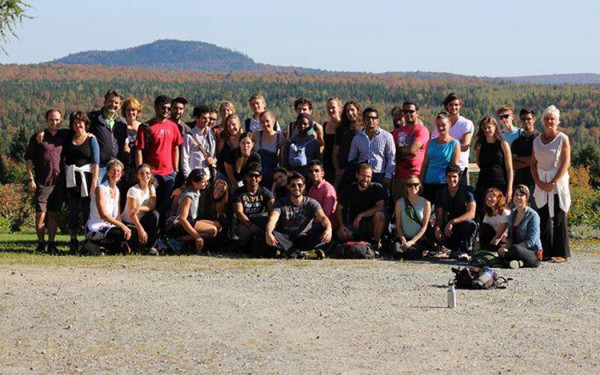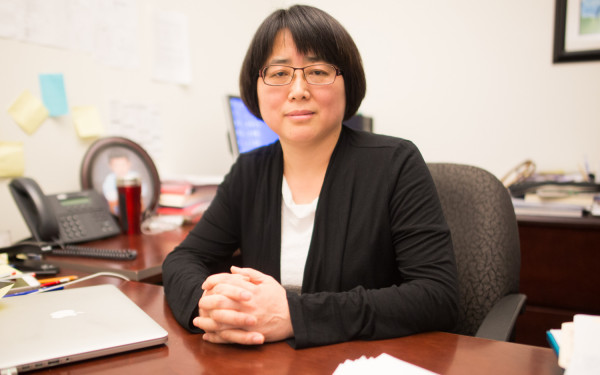Campus Sustainability, a Decade in the Making
Concordia’s Sustainability Action Fund Celebrates Its 10-Year Anniversary
Ten years ago, students gathered in Montreal’s Palais des congrès. And so did famed environmentalist David Suzuki and former United States Vice-President Al Gore.
Their presence at the same place and the same time was not a coincidence. The Less Talk, More Action environmental youth summit which brought them all there was a venue for students to listen, share, and collaborate with Suzuki and Gore serving as the conference’s keynote speakers.
“The energy in the room was pretty electric,” said Mohamed Shuriye, one of the conference’s student organizers. Given the nature of the political climate of the time, it was surprisingly positive.
“The feeling at the time was one of helplessness,” said Shuriye, also a former Concordia Student Union president. In context, he explained, 2006 was not a hopeful time for environmental activists.
“We weren’t seeing any […] movement on the federal level,” Shuriye said. “National treaties weren’t moving along,” citing the Harper government’s opposition to commit to con¬crete climate change policies.
Then, ten years ago, Concordia’s Sustainability Action Fund was born. At a time when students were wondering what they could do to address climate change in their daily lives, at their schools, in their places of work, Shuriye, as one of the fund’s founders, said “It was really about creating a platform to help build agency and say, ‘Yes, it’s something you can do.’”
During the spring 2007 CSU elections, a referendum question asked undergraduate students to approve a $0.25 per credit fee-levy, to serve as the financial backing for the fund. The Link reported at the time that this vote was more popular than the vote for the CSU executives themselves, with more than 4,000 students in favour of the SAF.
SAF’s fee-levy has remained the same since that initial vote in 2007. Every year they use about $115,000 of what they get from students to fund student-led initiatives, explained SAF CEO Nadra Wagdy. They’ve used this amount to help finance about 35 projects per year, she said. When he learned about the current scope that the SAF possesses, Shuriye said that he was very pleased.
Some of the projects they’ve helped include the ongoing Waste Not, Want Not composting campaign, the Sustainability Major Project which has been helping university faculties develop sustainability-related class curriculums and the new Creative Reuse Centre which will freely redistribute used or leftover materials from art projects.
“It’s continued to serve its goal of being a platform to create student agency, to take action,” he said.
Wagdy explained that while the fund has sustainability in the name, there’s much more to it than just the physical environment. “We view sustainability not just in terms of environmental health but community resilience, social justice, health and well-being, so it’s quite a broad spectrum,” she said.
When they receive funding applications— they’ve received 11 this month alone—Wagdy explained that they also try to keep in mind what students want, as they’re essentially the ones footing the bill. “For us, it’s always been what do students want us to focus on,” she said.
These trends, she continued, become visible through the types of projects that come across their table. Some years are focused on food security, for example, while others lean more towards social justice events, like rap battles.
She also explained that it’s in SAF’s mandate to look for projects that will have a lasting impact on students and on Concordia’s campuses. On their website, it reads that the fund has a “goal of inspiring and developing a culture of sustainability at Concordia University.”
This long term impact, Wagdy said, doesn’t exclusively mean projects that will have a long, physical presence on the university, although SAF has provided seed money for projects like the greenhouse’s City Farm School which has been around since 2011.
“I think one of the biggest impact we have is the learning experience, so the impact we have on the students themselves,” explained Wagdy. “So how did experience of leading a student-led alternative project, how did it affect them? What did they learn? How did it change their perspectives on sustainability or social justice?”
To receive funding, Wagdy said that a project must have a student-leader from Concordia.
This rule stemmed from the fund’s beginnings, said Shuriye. “The vision behind [the fund] was to put the power and the tools back in the hands of students to shape their campus and shape their wider society.”

_900_600_90.jpg)





